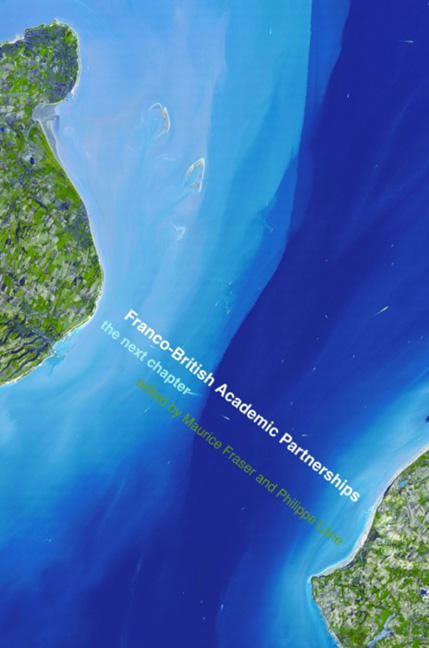Book contents
- Frontmatter
- Contents
- Notes on Contributors
- Foreword by His Excellency
- Foreword
- Preface
- Part I: Teaching and Training Partnerships
- 1 Why is the United Kingdom Important to Sciences Po?
- 2 Franco-Welsh Academic Partnerships: A Case Study Involving Transnational and Cross-sector Mobility
- 3 Double Diplomas: A Franco-British Training Route of Excellence for Teachers of French Worldwide?
- 4 The Entente Cordiale: A Grande École Engineering School Perspective
- 5 Links Between British Universities and French Instituts Universitaires de Technologie: New Forms of Collaboration
- 6 One Model: The Franco-German University
- 7 Raising Students’ International Profile: How Do Universities Address This Issue in Europe?
- 8 Franco-British Academic Partnerships at the University of Provence
- 9 University College London and France: Teaching and Research Collaborations
- 10 Université Paris 1 Panthéon-Sorbonne: An Overview of More Than 30 Years of Franco-British Partnerships
- 11 Towards a Vision for a Networked European Business School
- Part II: Research Partnerships
- Part III: Broader Perspectives
- Appendices: Addresses and Speeches at the Franco-British Academic Partnerships Seminar, French Institute, London, 5 February 2010
6 - One Model: The Franco-German University
from Part I: Teaching and Training Partnerships
- Frontmatter
- Contents
- Notes on Contributors
- Foreword by His Excellency
- Foreword
- Preface
- Part I: Teaching and Training Partnerships
- 1 Why is the United Kingdom Important to Sciences Po?
- 2 Franco-Welsh Academic Partnerships: A Case Study Involving Transnational and Cross-sector Mobility
- 3 Double Diplomas: A Franco-British Training Route of Excellence for Teachers of French Worldwide?
- 4 The Entente Cordiale: A Grande École Engineering School Perspective
- 5 Links Between British Universities and French Instituts Universitaires de Technologie: New Forms of Collaboration
- 6 One Model: The Franco-German University
- 7 Raising Students’ International Profile: How Do Universities Address This Issue in Europe?
- 8 Franco-British Academic Partnerships at the University of Provence
- 9 University College London and France: Teaching and Research Collaborations
- 10 Université Paris 1 Panthéon-Sorbonne: An Overview of More Than 30 Years of Franco-British Partnerships
- 11 Towards a Vision for a Networked European Business School
- Part II: Research Partnerships
- Part III: Broader Perspectives
- Appendices: Addresses and Speeches at the Franco-British Academic Partnerships Seminar, French Institute, London, 5 February 2010
Summary
In September 1997, the official founding document of the Franco-German University (the Agreement of Weimar) was signed by the French and German Ministries of Foreign Affairs. In 1999, after two years of preparatory work, the institution became a reality, in Saarbrücken. By agreeing to locate its administration there, the founders of the Franco-German University acknowledged the historical ties between their two countries: in 1815, Saarbrücken came under Prussian control, and twice during the twentieth century it was part of the Saar territory under French administration. Bridging this shared past, the Franco-German University (Deutsch-Französische Hochschule, or Université franco-allemande) strives to build a combined future through an association of affiliated universities in Germany and France. Specifically, its mission is to develop and promote dual degree programmes and transnational doctoral programmes in the context of a binational, bicultural and bilingual tertiary educational network. This network now consists of 180 universities offering 130 courses to 4900 students. The 2011 budget of €11 million reflects a 10 per cent increase on that of the preceding year.
Although the Franco-German University does not have a campus or faculty of its own, it does possess the basic characteristics of a university. Along with conferring dual degrees awarded by the partner institutions, it issues its own certificate confirming the special nature of the dual degree. Additionally, it organises calls for applications, arranges and manages the selection process, initiates joint programmes, provides funding to selected projects and coordinates their quality assurance.
As it seeks to advance the mobility of students and lecturers between France and Germany, and increase the number of graduates with intercultural competence and top-quality qualifications, the Franco-German University has had to grapple with a linguistic legacy of its founders, who envisioned the teaching and learning taking place in a bilingual environment. When the concept of the binational institution was being discussed in the 1980s, this environment did not include English, which is now the dominant academic language internationally.
While it regards the promotion of French and German as a positive linguistic side-effect of its activities, the Franco-German University does not see its primary role as a guardian of both languages, and neither does it wish to be regarded as a European bastion against Anglo-Saxon influences.
- Type
- Chapter
- Information
- Franco-British Academic PartnershipsThe Next Chapter, pp. 59 - 62Publisher: Liverpool University PressPrint publication year: 2011



